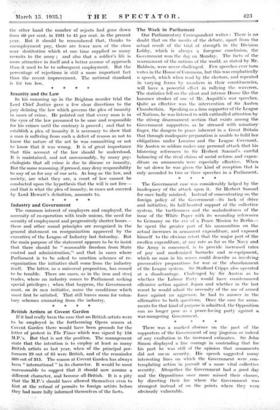The Week in Parliament Our Parliamentary Correspondent writes : There
is no doubt that on the merits of the debate, apart from the actual result of the trial of strength in the Division Lobby, which is always a foregone conclusion, the Government won the day on Monday. The facts of the rearmament of the nations of the world, as stated by Mr. Baldwin, were never challenged. Few speeches ever turn votes in the House of Commons, but this was emphatically a speech, which when read by the electors, and repeated in varying forms by members in their constituencies, will have a powerful effect in rallying the waverers. The statistics fell on the silent and intense House like the hammer strokes of one of Mr. Asquith's war speeches. Quite as effective was the intervention of Sir Austen Chamberlain. Speaking as a firm supporter of the League of Nations, he was listened to with enthralled attention by the stiong disarmament section that exists among the Government supporters, as he stressed with minatory' finger, the dangers to peace inherent in a Great Britain that through inadequate preparation is unable to fulfil her obligations under Locarno and the League Covenant. Sir Austen so seldom makes any personal attack that his blistering references to Sir Herbert Samuel's careful balancing of the rival claims of social reform and expen- diture on armaments were especially effective. When he sat down he was given the kind of reception that is only accorded to two or three speeches in a Parliament.










































 Previous page
Previous page